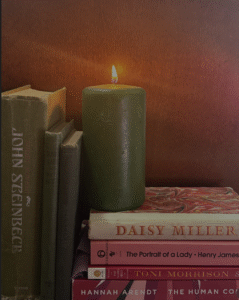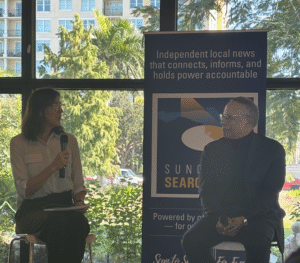The night after the results of the 2024 election were announced, my closest girlfriends and I went to the beach. The sun was setting and a pink hue brushed the clouds. A light color against the darkness of the day. We dipped ourselves in the cold water and hoped that our overwhelming despair would wash away in the vast ocean. When the sun set, we lay on the sand and looked at the sky. I thought of a phrase that then-Vice President Kamala Harris had offered during her concession speech, likely referencing Rev. Dr. Martin Luther King, Jr.’s final speech: “Only when it is dark enough can you see the stars.”
I am a Political Science Area of Concentration (AOC) student attending New College of Florida at a time when my major alone is a hot-button issue. Instead of simply reading about the politics of censorship or gender studies, I am living it. When I joined the staff of New College’s former student-run newspaper, the Catalyst, in my first year in 2023, I wanted my voice to matter and I wanted to make a difference in a politically turbulent environment.
For an hour and a half, twice a week, Catalyst staff meetings were a safe haven for expressing frustrations and grievances about the overhaul of our college. We could speak freely on the values and courses that were being taken away. How we felt unsafe and even persecuted for being student journalists. How faculty were afraid to be interviewed, and how the vague emails from former Director of Communications Nathan March stonewalled us at every turn and rendered us unable to finish our articles and assignments.
“Not supporting young journalists in their efforts to learn and practice their craft is detrimental not only to their education but to the college journalism experience as a whole,” former Catalyst staffer and current Old School Catalyst staff writer Chloe Rusek (’24) wrote in her article on the trials she had to endure in her attempts to simply interview President Richard Corcoran.
With another Donald Trump presidency now in full swing, the future of student journalism looks even more bleak. Censorship and classes focused on right-wing ideologies and discussions meant to discredit and dismantle a gender, race and culturally diverse education are vindicated by what the United States has chosen as its leadership.
“Some in the Republican party see the effort to transform New College as a model in a wider battle to take on American higher education, which the right-wing sees as dominated by left-leaning institutions and leaders,” Jason Wilson reported in The Guardian on Nov. 11, 2024. “With Donald Trump returning to power after winning the presidential election last week, many right-wing activists could seek to replicate what has happened to New College across the U.S.”
Now, more than ever, students are afraid to talk. As a founding reporter for Old School Catalyst, I am worried about my future as a student journalist and my hope to be a full-time journalist once I graduate. The failure of Florida’s Amendment Four, a proposed state constitutional amendment to prohibit any laws restricting the right to an abortion, broke my heart. I had never felt so powerless over my own body as when I was refreshing the 57 percent who voted “yes” every three seconds that Tuesday night.
In the four months leading up to the election, I had been following the rape and abuse trial involving Gisele Pericot of France quite closely. Fifty-five men and her ex-husband, Dominique Pericot, were on trial, accused of drugging Pericot and raping her while she was unconscious. Pericot had the option to keep the trial private but chose to have her identity and the proceedings made public to shed light on drug-related assault. On October 19, 2024, hundreds of demonstrators stood outside the Mazan, France courthouse throughout November and December, rallying support for her and her bravery.
“Placards they held up read: ‘Shame must change sides,’ ‘Stop the denial,’ ‘Not your punching ball’ and ‘We are all Gisele. Are you all Dominique???’” according to John Leicester of the Associated Press.
Pericot’s courage and support from France made me believe that the narrative for women was changing. She inspired me and hundreds of women to not go away quietly. Her bravery to be questioned on the witness stand, with her daughter and community watching, still leaves me in awe at the fearlessness and tenacity of her character. She kept a poised and calm disposition throughout the entire trial and was applauded by her community.
I was armed for battle in the fight for Amendment Four. Seven states did vote to protect a woman’s right to choose. To protect women from bleeding out in a hospital because doctors are afraid to operate, and women who cannot afford to take time off of work or buy a plane ticket to seek medical care.To combat my desolate feelings of utter helplessness, I turned to books—my common cure to life’s ailments. bell hooks, an intersectional feminist writer who used to be quoted at the New College Jane Bancroft Library, writes in Feminism is for Everybody: Passionate Politics, “Many of us were the unplanned children of talented, creative women whose lives had been changed by unplanned and unwanted pregnancies. We witnessed their bitterness, their rage, their disappointment with their lot in life and we were clear that there could be no genuine sexual liberation for women and men without better, safer contraceptives, without the right to a safe, legal abortion.” I am at a true loss to understand how the rights that women marched for only two generations ago are being taken away.

I write because it is all I can do. I write to inspire others to keep fighting back. Education is action. Take Gender Studies classes when they are offered. Question decisions made by administrations and discuss with fellow students. Read books like Chanel Miller’s Know My Name, Jessica Knoll’s Bright Young Women, Margaret Atwood’s The Handmaid’s Tale and others that expose how media, society and courtrooms vilify abused women. She Said by Jodi Kantor and Megan Twohey is a journalistic account of how two investigative reporters in the wake of the #MeToo Movement exposed Harvey Weinstein’s years of sexual abuse against women.
The government encroaching on control of our lives, our bodies, our books will not be done silently. These stories are important. A woman’s right to autonomy over her own body is just as important as educational freedom. Student journalists who expose these stories, now more than ever, are important.




